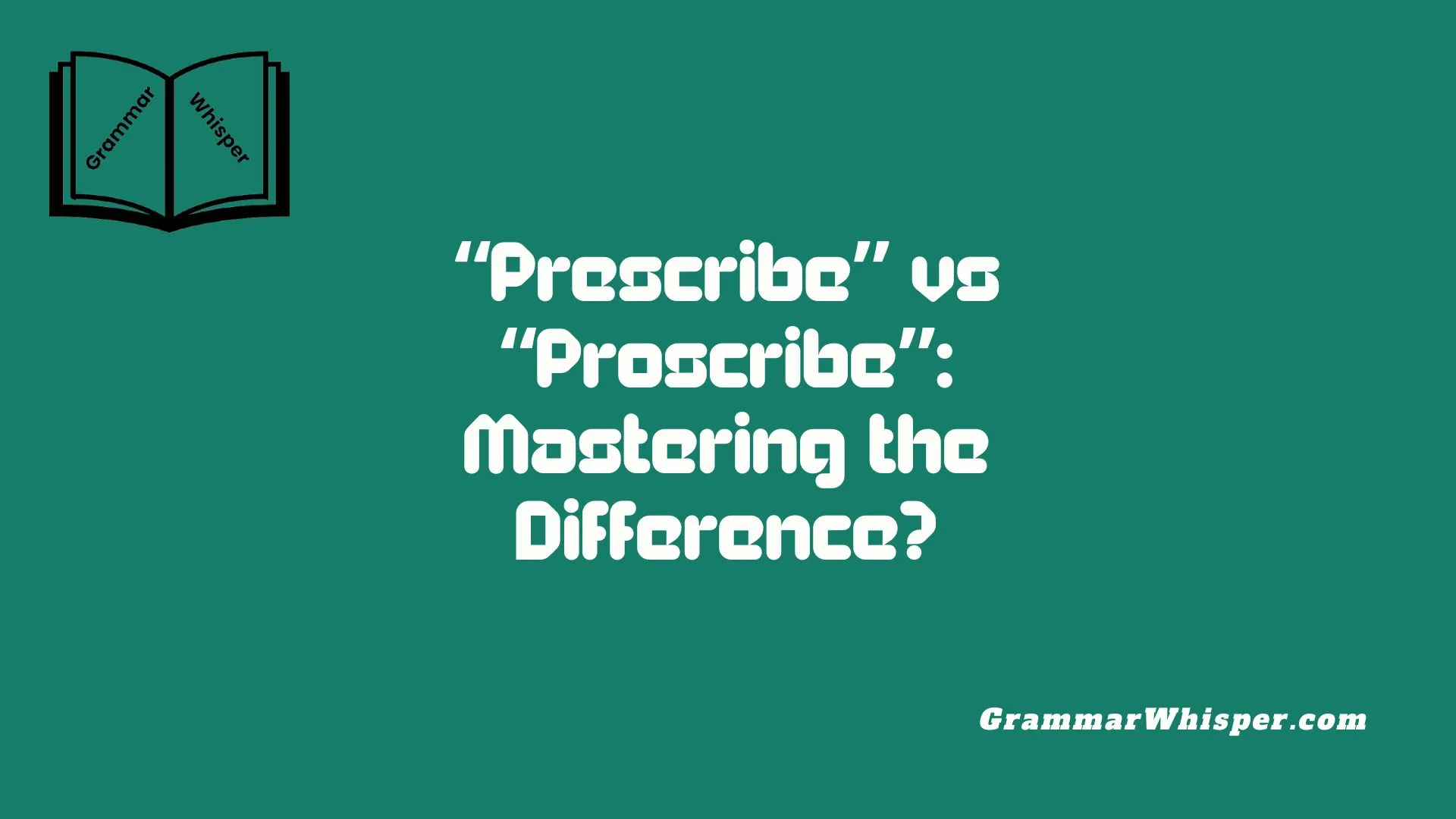I once read a news headline where a new law prescribes that citizens must not post protest pictures. My eyes had to pause. Was it meant to recommend or forbid? This confusing scenario shows up all the time – in everyday writing, public messaging, and professional communication. People often don’t realize that misusing “Prescribe” vs “Proscribe” muddles your intent, causes harm, and weakens the message’s clarity.
Through my editing experience, I’ve learned that real understanding of word choice is essential, not pedantic. The difference between what a policy prescribes and what it forbids can completely change how citizens interpret their rights and restrictions. Whether you’re crafting a formal statement or sharing images online, precision in language truly matters. Getting it right isn’t about sounding smart – it’s about communicating clearly, ethically, and effectively versus creating confusion.
Clear Definitions: Prescribe vs. Proscribe
| Word | Definition | Tone | Part of Speech |
| Prescribe | To recommend, assign, or authorize (especially in medicine or regulation) | Neutral to positive | Verb |
| Proscribe | To forbid, ban, or condemn | Negative | Verb |
Prescribe speaks of direction, guidance, or recommendation.- Proscribe implies prohibition, censorship, or exclusion.
These words sound alike, share roots, yet stand on opposite semantic poles. Recognizing this contrast ensures crisp, unambiguous communication.
Etymological Origins: Latin Roots Revealed
Diving into Latin reveals why these words flip meanings.
- Prescribe comes from prae- (before) + scribere (to write). Literally, “to write beforehand.” Modern sense: setting parameters or recommendations in advance.
- Proscribe comes from pro- (publicly or forward) + scribere. Originally, proscribere meant to publish a formal notice, especially a death sentence or banishment. Over the centuries, that sense focused on prohibition.
Both words share scribere (“to write”), yet evolved in cultural and social contexts. That context transforms prescribe into “guidance” and proscribe into “commanded restriction.”
How to Use “Prescribe” Correctly
Common Cases for “Prescribe”
- Medical context: “The doctor prescribed a five-day course of amoxicillin.”
- Rules or policies: “Company policy prescribes using encrypted email for client correspondence.”
- Behavioral advice or recommendations: “Self-care experts prescribe a daily 15-minute meditation.”
Tips for Formal Writing
- In academic or legal writing, prescribe often appears as “The statute prescribes…”
- Formal style tip: Prescribe comes with documentation – it’s authoritative, from a recognized source or policy.
Quick Fact
- In U.S. legal language, prescribe refers to the act of officially setting conditions or procedures via statute.
Press pause before using prescribe – ask yourself, am I recommending, assigning, or directing?
When “Proscribe” Is the Right Word
Typical “Proscribe” Uses
- Legal bans or government rules: “The new regulation proscribes the use of plastic for single-use shopping bags.”
- Cultural or societal condemnation: “Some cultures proscribe speaking out against elders.”
- Academic or historical contexts: “Rome’s proscription lists in 82 BC marked political enemies for execution.”
Modern Connotation
- Prescribe carries weight. It doesn’t just ban; it formalizes exclusion or taboo.
Real-World Example
- The UK’s Communications Act 2003 proscribes terrorist organizations by name, making support for them illegal.
When you want to indicate formal prohibition, proscribe hits home.
Side‑by‑Side Contextual Examples
| Sentence Example | Correct Word | Why It Works |
| “The physician ___ a resting period for nine days.” | prescribed | The doctor gives a recommendation; it aligns with its meaning |
| “The city ordinance ___ smoking inside public buildings.” | proscribes | The law formally bans smoking; using proscribe makes sense |
| “The editor ___ a format for all image captions in this journal.” | prescribed | Assigns a format – fits recommendation usage |
| “That rule ___ any discussion of confidential topics.” | proscribes | Forbids discussion; prohibition is implied |
Mini Quiz
Fill in the blank with prescribe or proscribe:
- “Our handbook ___ detailed reporting procedures for workplace incidents.”
- “State law ___ gambling in public venues.”
- “Work ethic coaches ___ daily goal-setting for productivity.”
(See the Author’s answer key at the end to test yourself.)
Pronunciation: The Phonetics That Fool Us
These words differ subtly:
- Prescribe → /prɪˈskraɪb/
- Proscribe → /proʊˈskraɪb/
Note: vowels shift from ɪ to oʊ. In speech, especially with regional accents this difference can get washed out.
Pronunciation Tips
- Focus on the first vowel sound:
- “pri-” (as in “prism”) ➞ prescribe
- “pro-” (like “protest”) ➞ proscribe
- A reminder rhyme: “PRE‑scribe gives PRE‑authorized advice. PRO‑scribe PROHIBITS on public notice.”
Memory Hacks: Mnemonics That Stick
Long memory fades fast. Grab these tricks:
- Prescribe = Pre = Before
- Think preorder, prepay – all pre- looks forward.
- Proscribe = Prohibit
- The words share pro-, linking them tightly in meaning.
- Visual cues
- Picture a doctor writing a prescription slip = prescribe.
- Imagine a government notice with a “banned” red stamp = proscribe.
- Word families
- Prescribe ⇢ prescription, prescriptive
- Proscribe ⇢ proscription, proscribed
Each mnemonic ties to familiar words – much easier than rote memorization.
Common Pitfalls & Misuses in Real Writing
Real-World Misuse
- Headline: “New policy prescribes racial profiling in airport security.”
- Should read proscribes – because it bans profiling. Misuse sends the opposite message.
Why Mistakes Matter
- Misusing these can:
- Alter intent – recommendation vs. prohibition.
- Undermine credibility of writing or argument.
- Carry legal consequences – getting policy phrasing wrong can change enforcement.
SEO & Clarity Impact
- Online writing thrives on precision. Misusing one word can:
- Lower search precision (Google might misunderstand your content’s intent).
- Confuse the reader, breaking trust.
Crafting content that Google values? You need exact language, especially for legal, medical, policy content.
Case Studies: Flipped Meanings Lead to Chaos
Case Study 1: Corporate Policy Notice
- Original: “Policy prescribes the misuse of company funds.”
- Reality: They meant proscribe.
- Outcome: Employees misunderstood that overspending was recommended! The organization had to issue urgent clarification.
Case Study 2: Health Authority Announcement
- Wording: “Doctors proscribe two surgery check-ups every year.”
- Actual Intent: Prescribe.
- Confusion: Doctors thought they’d banned surgery follow-ups. Patients missed vital appointments.
Case Study 3: Social Media Headline
- “School district proscribes homework during spring break.”
- Audience Reaction: Do students get assigned homework or banned from homework? The ambiguity sparked debate – until the district changed wording.
Pronunciation Practice: Tools & Tips
- IPA Chart Pronunciation
- Prescribe: /prɪˈskraɪb/
- Proscribe: /proʊˈskraɪb/
- Practice sentence drills (out loud!)
- “I’d prescribe extra rest for my patients.”
- “The university proscribes plagiarism.”
- Audio tools
- Use dictionary audio playback or pronunciation websites to compare the two.
Summary Table
| Feature | Prescribe | Proscribe |
| Meaning | Recommend, authorize, assign | Forbid, ban, condemn |
| Tone | Neutral or positive | Formal, negative, emphatic |
| Usage | Medicine, rules, advice | Laws, regulations, history |
| Pronunciation | /prɪˈskraɪb/ | /proʊˈskraɪb/ |
| Common Mnemonic | Pre = before, set forward | Prohibit, pro = ban |
How to Never Mix Them Up Again
- Ask yourself: “Am I recommending or banning?”
- Slip into tense and tone: match “prescribe → recommendation”, “proscribe → prohibition.”
- Use visual mnemonic: pre-prescribe, pro-proscribe.
- Say it loud and slow – “pri-SCRIBE” vs. “pro-SCRIBE.” Notice how the first vowel walks in front of the word or slides in long.
Mini Quiz Answers
- Prescribe: “Our handbook prescribes detailed reporting procedures…”
- Proscribe: “State law proscribes gambling on public property.”
- Prescribe: “Work ethic coaches prescribe daily goal-setting…”
Conclusion:
Words have power – and choosing the right one makes all the difference between clarity and confusion. When you prescribe, you guide. When you proscribe, you forbid. It’s that simple – and knowing this means your writing stays sharp, trusted, and credible.
Next steps:
- Bookmark this article.
- Try writing sentences with both words.
- Challenge yourself with quizzes.
- Share this with a friend – because clear communication is contagious.
Bonus: Related Word Pairs for the Curious
- Affect vs. Effect
- Infer vs. Imply
- Compliment vs. Complement
Understanding “prescribe vs. proscribe”? Now you’ve unlocked one of English’s most common mix-ups.
FAQs
Can “prescribe” and “proscribe” ever be used interchangeably?
No. While they look and sound similar, they have opposite meanings. “Prescribe” means to recommend or authorize something (like a doctor prescribing medicine), while “proscribe” means to forbid or ban something, especially by law. Using them interchangeably can completely reverse the intended meaning.
Is “proscribe” just a fancier way to say “ban”?
In a way, yes – but “proscribe” is more formal and often used in legal, academic, or governmental contexts. It implies a formal or official kind of ban, whereas “ban” is broader and more conversational.
What are the noun forms of “prescribe” and “proscribe”?
- Prescribe → Prescription (e.g., “a doctor’s prescription”)
- Proscribe → Proscription (e.g., “the proscription of certain books during wartime”) Each noun retains the tone of its verb – recommendation vs. prohibition.
How can I remember which is which?
Use this mnemonic:
- Prescribe starts with “pre” like “prepare” – think of preparing guidance or advice.
- Proscribe starts like prohibit – both mean to forbid.
Are there any similar word pairs I should watch out for?
Yes! English has several tricky word twins:
- Affect vs. Effect
- Elicit vs. Illicit
- Imply vs. Infer These pairs also sound similar but carry different meanings – mastering them improves clarity and writing precision.











